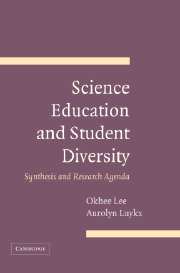Book contents
- Frontmatter
- Contents
- Foreword by Roland G. Tharp
- Acknowledgments
- Introduction
- SECTION I CONCEPTUAL GROUNDING AND POLICY CONTEXT
- SECTION II STUDENT LEARNING AND CLASSROOM PRACTICES
- SECTION III CREATING EQUITABLE LEARNING ENVIRONMENTS
- 7 Teacher Education
- 8 School Organization and Educational Policies
- 9 School and Home/Community Connections
- SECTION IV CONCLUSIONS AND A RESEARCH AGENDA
- Appendix: Method for Research Synthesis
- References
- Index
8 - School Organization and Educational Policies
Published online by Cambridge University Press: 04 December 2009
- Frontmatter
- Contents
- Foreword by Roland G. Tharp
- Acknowledgments
- Introduction
- SECTION I CONCEPTUAL GROUNDING AND POLICY CONTEXT
- SECTION II STUDENT LEARNING AND CLASSROOM PRACTICES
- SECTION III CREATING EQUITABLE LEARNING ENVIRONMENTS
- 7 Teacher Education
- 8 School Organization and Educational Policies
- 9 School and Home/Community Connections
- SECTION IV CONCLUSIONS AND A RESEARCH AGENDA
- Appendix: Method for Research Synthesis
- References
- Index
Summary
Classroom practices occur in the context of school policies and institutional structures, which are shaped by policies mandated by the individual school district, the state, and the nation. Policies are interpreted and mediated by educational actors at every level of their implementation, to the extent that they are sometimes implemented in ways that are directly contrary to their presumed goals. A limited body of literature highlights features of school organization that influence science teaching for students from nonmainstream backgrounds. Another limited body of literature describes how district, state, and federal policies on science instruction and assessment influence classroom practices and science learning.
School Organization
The limited literature on school organization in relation to science education for diverse student populations addresses such issues as tracking, school restructuring, school leadership, and resources to promote change in instructional practices and student learning. In general, these factors affect the learning opportunities available to nonmainstream students more than those available to mainstream students, since the latter more often enjoy other supports for their science learning (e.g., better-equipped schools, highly educated parents, etc.). In contrast, the academic success of nonmainstream students depends more heavily on an adequate school environment, and it is precisely these students who are less likely to have access to such environments, particularly in inner-city schools. As described in this chapter all the studies focus on urban contexts.
Tracking
Tracking or ability grouping results in differential learning opportunities for different groups of students (Oakes, 1990).
- Type
- Chapter
- Information
- Science Education and Student DiversitySynthesis and Research Agenda, pp. 124 - 137Publisher: Cambridge University PressPrint publication year: 2006



